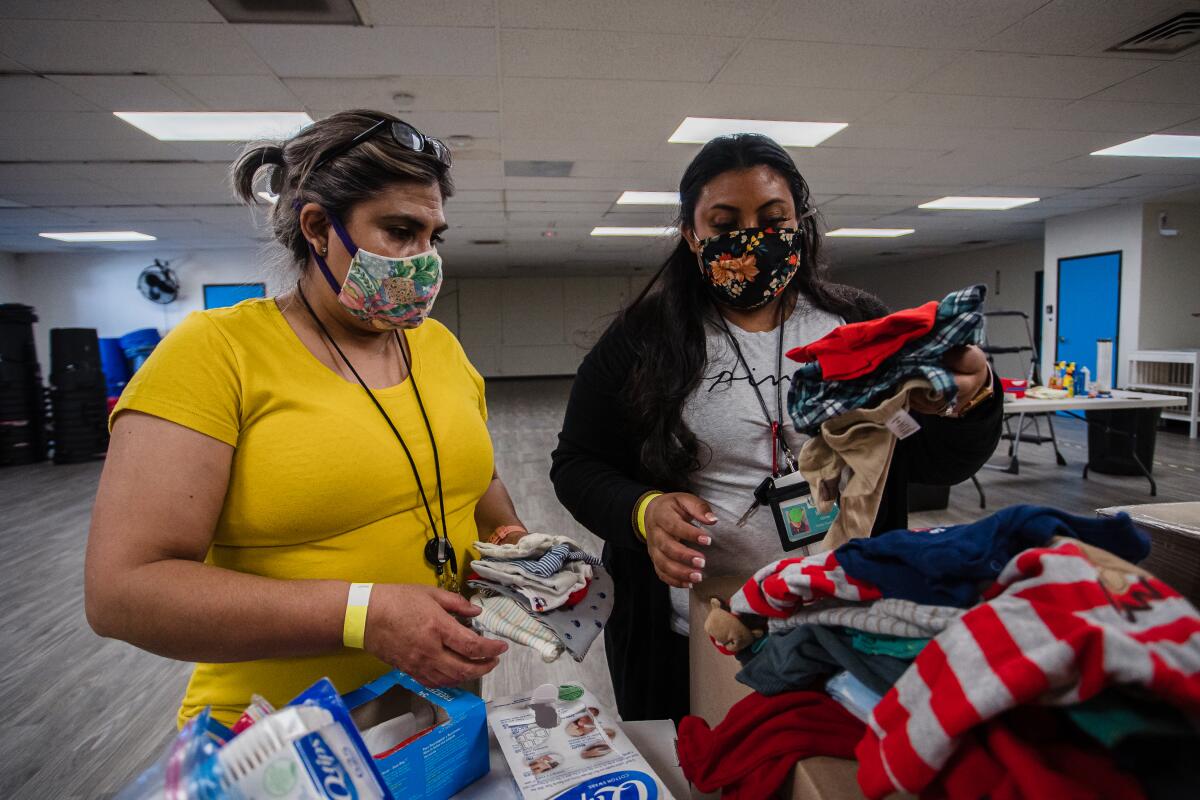Some asylum seekers trickle across border, others turned away as Biden guidance unfolds

- Share via
SAN DIEGO — When Mercedes and her family were finally allowed into the United States in January because of her husband’s serious heart condition, they were quarantined in a San Diego hotel room for weeks.
It was a familiar setting for the Honduran family of three, which fled gang threats to seek refuge in the United States. They’d had to quarantine in a hotel once before, to get a spot in one of the migrant shelters in Tijuana after they were held hostage by criminals while they waited to request asylum.
They are among the small number of asylum-seeking families who have been allowed to enter the United States since President Biden took office. That number has grown in recent weeks, though it is nothing that resembles the “surge” that some have reported at the border.
It’s unclear what criteria are used to determine who is permitted to cross the border and who gets turned back to Mexico or sent back to their home countries under Title 42, the name of an order put in place by the Centers for Disease Control and Prevention under the Trump administration after the pandemic began that allows for the immediate expulsion of border crossers.
The Biden administration has promised to undo many of the border and asylum policies created under President Trump. On Friday, the Biden administration announced plans for asylum seekers with pending immigration court hearings who are waiting south of the border under Trump’s “Remain in Mexico” program to be allowed into the United States while their cases proceed.
The first of an estimated 25,000 asylum seekers in Mexico with active cases will be allowed in on Feb. 19, the Associated Press reported. Sources familiar with the Biden team’s plans told the San Diego Union-Tribune that the San Ysidro Port of Entry will be one of the first to begin this processing.
For now, though, not much has changed for the thousands of asylum seekers who have been stuck on the Mexico side for months and sometimes years.
Asylum processing remains closed to the vast majority of them, a fact that has many immigrant rights advocates worried the Biden administration is moving too slowly.
And, in the absence of information or a timeline for the promised changes, the advocates say, some who have been waiting — particularly those living in desperate conditions in Mexico — listened to rumors or smugglers and tried to cross illegally into the United States.
Even the plan announced Friday will not address the thousands more who, because of other Trump policies, were waiting for the opportunity to request asylum in the first place.
“What we need is for the government to provide concrete information about when and how many people and who they will be allowing to process, because that’s at this point the only thing that’s going to convince people that it’s worth waiting,” said Alex Mensing of Innovation Law Lab, who communicates regularly with asylum seekers around Tijuana.
“If they hear as they immediately and inevitably do that some families are being released into San Diego, some people are going to take the risk to cross either because of the danger that they’re in here, the abhorrent conditions that they’re in here, [or] the discrimination that they faced from local police.”
The White House and the Department of Homeland Security did not respond to emailed requests for comment on asylum processing at the border.
Jen Psaki, White House press secretary, reiterated the administration’s main message four times during a briefing Thursday, “This is not the time to come.”
“The vast majority of people are turned away at the border,” Psaki said. “And we are committed to putting in place a moral and a humane system and process, but we are also digging out of four years of detrimental policies, as it relates to immigration, and that’s going to take some time.”
Since November, staff with Jewish Family Service, which runs a migrant shelter in San Diego, has seen a trickle of families like Mercedes’ released to their care.
In the past week or so, the number of families received by Jewish Family Service has increased, though the numbers are still much lower than other times in the shelter’s history. Most of these additional families were caught crossing illegally into the United States by the Border Patrol, according to Kate Clark of Jewish Family Service.
In December, the shelter helped 54 people, she said; in January, it helped 144 people. From Feb. 1 through 10, it helped 191 people.
When the border was open and asylum seekers were regularly allowed into the United States, the shelter generally received between 60 and 80 people a day and a maximum of 300 in one day, Clark said.
Border officials’ decision to release these families into the United States now, while continuing to turn others back, does not appear to be tied to a particular vulnerability, medical or otherwise, or any announced policy change.
There are notably few Central Americans among those released from Border Patrol custody in San Diego, Clark said. The majority are Haitian.
However, not all Haitians who have crossed the border illegally from Tijuana ended up at the San Diego shelter. Others in recent weeks have ended up on deportation flights back to Haiti, expelled under Title 42 after crossing, according to Katerine Girón Martínez of Tijuana’s Espacio Migrante shelter. Still others were returned to Mexico under that same CDC order.
When asked about the situation, the Border Patrol said that decisions are made on a case-by-case basis.
“CBP has seen a steady increase in border encounters since April 2020, which, aggravated by COVID-19 restrictions and social distancing guidelines, has caused some facilities to reach maximum safe holding capacity,” said Justin Castrejon, spokesman for the Border Patrol in the San Diego sector, referring to the institution’s parent agency Customs and Border Protection.
When that happens, Castrejon said, some migrants will be released to wait for immigration court hearings in the U.S.
When families like Mercedes’ are released into the San Diego area, they are sent to Jewish Family Service, which coordinates with the county’s public health department to quarantine the families in hotel rooms for 14 days. During that time, meals are delivered at appointed times, and shelter staff provide toys and children’s activities to help families pass the time.
Meanwhile, shelter staff help make arrangements with each family’s loved ones for travel after the family finishes quarantine.
Mercedes said she and her family ended up in quarantine for 24 days because her husband had to go to the emergency room with a heart problem during their stay at the hotel.
“Going back to repeat the same story was nothing new for us,” Mercedes said in Spanish. “But at the same time it’s not easy being inside four walls, to only be like chickens they throw food to. That’s not easy.”
Mercedes asked that only her first name be used because she was worried that publishing her identity might negatively affect her family’s asylum case.
She and her husband, along with their teenage daughter, fled Honduras in 2018 after gangs repeatedly threatened and attacked her husband because of his job as a bus driver. They were robbed several times on the journey to the border. Because they kept having to stop to work to earn enough money to continue traveling north, they arrived in Tijuana in late 2019.
For a while, they lived in a room inside the Tijuana business that had hired Mercedes’ husband. Then, in May 2020, burglars came to rob the place. The family was held hostage for hours during the robbery.
After that, the family found its way to one of the local migrant shelters. But even there, they were unable to find suitable treatment for the husband’s heart condition.
Through a team of lawyers with Jewish Family Service, they convinced border officials to “parole” them into the United States. They are now living on the East Coast with friends.
Other families with serious medical needs have had their requests denied in recent weeks.
A Cuban family with a son who has an illness that could cause him to lose his motor skills if it is not treated soon, was recently denied parole.
“Whenever we get a denial, we never get a why,” said Luis Gonzalez, an attorney with Jewish Family Service who helped the family. “Sometimes we do see some inconsistencies.”
Jewish Family Service, along with Innovation Law Lab, Al Otro Lado, Immigrant Defenders Law Center and other San Diego and Tijuana groups are part of a binational task force that met with Biden’s transition team starting in November and still meets with his administration to talk about policies for asylum seekers and the border.
The task force presented proposals to the Biden team about how to begin processing asylum seekers.
Erika Pinheiro, litigation and policy director for Al Otro Lado, said that, based on the details coming out, the administration is going in a different direction from several of the task force’s suggestions.
“They seem to be making things more complicated than they need to be,” Pinheiro said.
The task force organizations on both sides of the border say the message they want most to send to Biden is that they are ready.
“We’re ready. The migrants are ready,” Pinheiro said. “Characterizing this as a burden or this complex issue where it’s too much for anybody to handle, that’s just not the case.”
More to Read
Sign up for Essential California
The most important California stories and recommendations in your inbox every morning.
You may occasionally receive promotional content from the Los Angeles Times.











